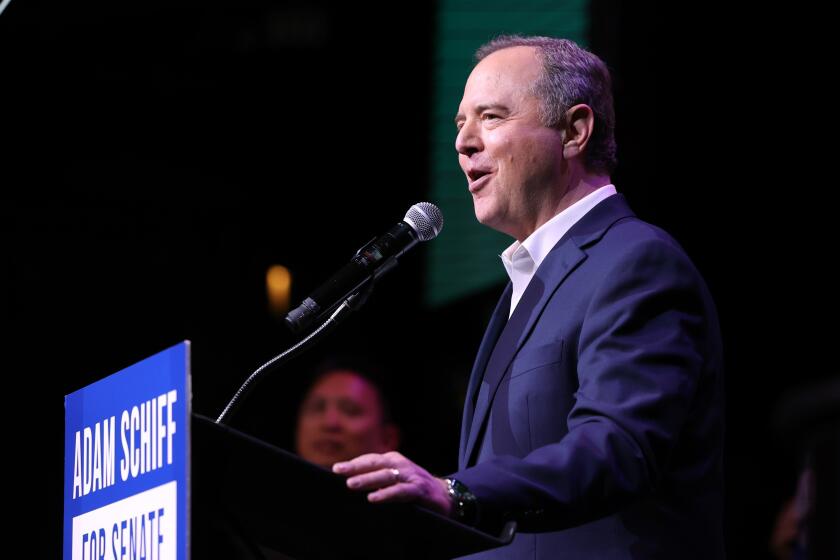The siren song of electoral mandates
November’s congressional election will almost certainly create a wave of Republican victories and a long list of Democratic congressmen thrown out of office.
But will the election produce a clear mandate for a new conservative agenda? That will depend on who’s doing the analysis.
If Republicans follow the usual pattern, the morning after election day, they will claim that the voters have delivered a clear message in favor of their agenda of lower taxes, smaller government and the repeal of President Obama’s healthcare law. But the evidence for such a mandate is thin.
The Republicans are right on one basic truth: Most voters are unhappy with the state of the nation and they don’t think the Democrats’ attempts to fix it are working. But beyond that, there’s no consensus in favor of the prescriptions offered by either party.
In a Wall Street Journal/NBC News poll released last month, voters divided cleanly down the middle on which party they wanted to see in control, 44% to 44%. But when those who favored the Republicans were asked why, most said it was because of their dissatisfaction with the Democrats, not their support for GOP proposals.
In the same poll, on the most fundamental question dividing the two parties, the voters split down the middle again: Half said they believe the federal government is “doing too many things”; half said they believe the government should be doing more.
Digging a little deeper, another survey found a three-way split among voters on whether the federal government should play a central role in solving the nation’s economic problems. A little over a third, 35%, agreed with the conservative principle that “government is not the solution to our economic problems; government is the problem.” A smaller group, 28%, agreed with the liberal argument that “the government must play an active role in regulating the marketplace.” And in the center, a pragmatic 33% said they’d like to see the government fix the economy but weren’t sure they could trust it to do the job well.
That doesn’t sound so much like a mandate for minimal government; it’s an invitation for each party to try to make government work.
The poll, sponsored by National Journal magazine and Allstate insurance, also found that reducing the federal deficit ranks relatively low on most voters’ priority lists. Asked to choose among three broad policy prescriptions, the largest group, almost 40%, chose “reducing taxes and regulation.” The next largest, 33%, opted for increased government spending on infrastructure, education and other programs, even if that means higher taxes. Only 20% said reducing the deficit should be the central goal.
All that ambivalence among voters is one reason the Republicans’ national campaign has become a little blurry about exactly what a GOP majority would do if it takes control of the House next year.
When House Republican leader John A. Boehner unveiled his party’s “Pledge to America” last month, some conservative activists were disappointed. The pledge promised to repeal the healthcare law, block new tax hikes and cap discretionary federal spending, but it didn’t set a clear target for reducing the deficit or spell out any of the deeper spending cuts that would be needed to do that. It promised to “protect” Medicare but not to rein in Medicare spending, the biggest single component of the swelling deficit.
In the campaign, Boehner has talked more about what voters don’t like than what he would do to change the picture if he becomes speaker of the House.
“The American people are outraged with what Washington is doing,” he said last month. “They are tired of all the spending. They’re tired of all the debt. And they keep asking the question, where are the jobs?”
That platform of channeling public anger could help Boehner’s GOP win a majority, but it doesn’t build a mandate for specific proposals.
You don’t have to look far back in history to find American leaders who thought the public had given them solid mandates, only to learn that their support was built on sand.
In 2008, President Obama won the White House with 53% of the popular vote amid an economic crisis that had voters clamoring for federal action. So he passed a $787-billion stimulus bill and kept a promise to his Democratic Party by muscling through an ambitious healthcare reform law. The result: Independent voters deserted him in droves.
In 2004, then- President George W. Bush won 51% of the vote and interpreted his majority as a mandate to remake the Social Security system to include individual accounts. That mandate wasn’t there, and Bush’s defeat on the issue helped send his second term downhill.
Or, for an example Boehner may find closer to home, in 1994 one of his predecessors, Newt Gingrich, led Republicans to a majority in the House with a promise of lower taxes and smaller government, the “Contract with America.” But when Gingrich pushed his luck in budget negotiations with President Clinton and forced the federal government to shut down, the public turned against him, and he soon ranked as the nation’s most unpopular politician.
Boehner and his party hope they are about to repeat the experience of 1994, when the GOP seized control of the House. If they do, their next test will be whether they can avoid repeating the experience of 1995 — the error of overestimating their mandate.
doyle.mcmanus@latimes.com
More to Read
Get the L.A. Times Politics newsletter
Deeply reported insights into legislation, politics and policy from Sacramento, Washington and beyond. In your inbox three times per week.
You may occasionally receive promotional content from the Los Angeles Times.











